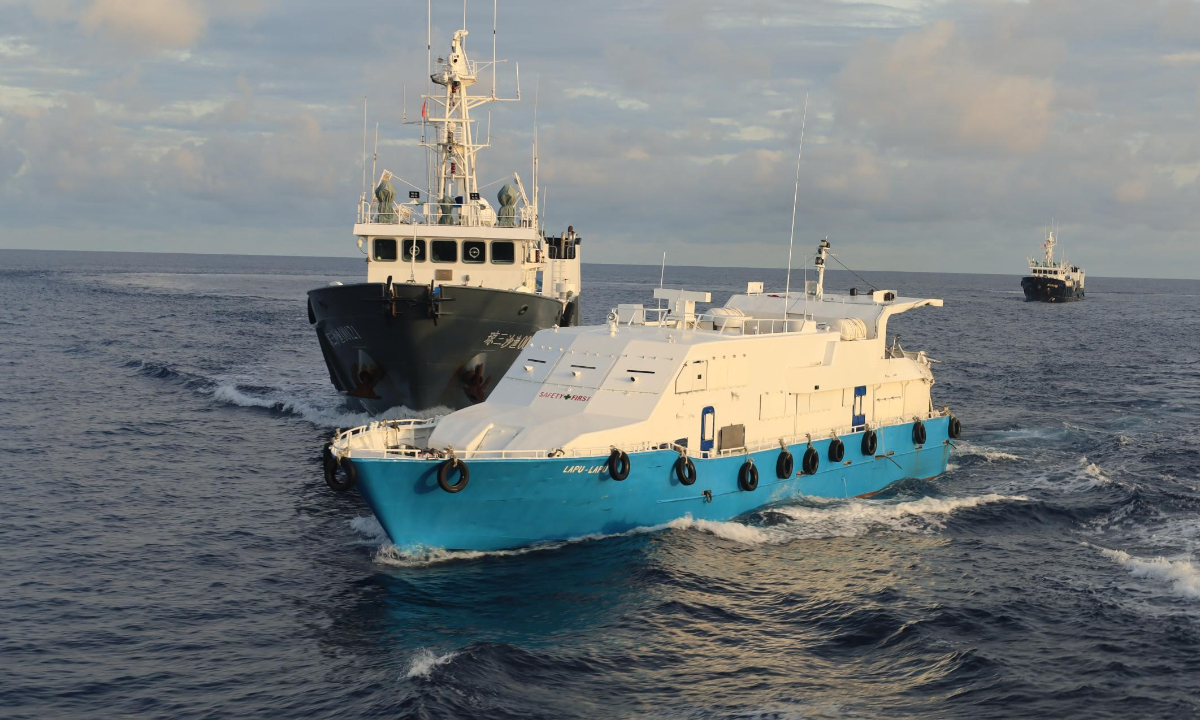Exclusive: Philippine personnel ram Chinese boats, spray unknown liquids at China Coast Guard during illegal intrusion near Ren'ai Jiao

A Philippine supply ship dangerously approaches a Chinese vessel in waters off China’s Ren’ai Jiao in the South China Sea on June 17, 2024. Photo: Courtesy of China Coast Guard
More details about Philippine vessels' illegal intrusion into waters near China's Ren'ai Jiao (also known as Ren'ai Reef) in the South China Sea on Monday have been unveiled. Contrary to Manila's accusations and smears, the actual situation was that, in the face of normal law enforcement actions by the China Coast Guard (CCG), Philippine military personnel engaged in repeated aggressive actions, such as ramming CCG enforcement boats and spraying unknown liquids at CCG enforcement personnel, the Global Times has learned.
On Monday, the Philippines broke its commitment by sending a supply ship and two inflatable boats to illegally enter the waters adjacent to the Ren'ai Jiao of China's Nansha Islands, in an attempt to deliver supplies to its illegally "grounded" warship.
Philippine Coast Guard spokesperson Jay Tarriela had earlier publicly stated that it was purely a military operation, while a "source" from the Philippine side also told the media that this operation was led by the Philippine Armed Forces.
Images obtained by the Global Times also show that the Philippine vessels that intruded into Ren'ai Jiao were mostly equipped with Philippine navy equipment, including high-speed assault boats of the Philippine navy special forces that can be armed with heavy machine guns. Philippine media reports also admitted that the Philippine military carried eight American-made AR-15 automatic rifles during this operation, which were confiscated by the Chinese side.
Although the Philippines deployed quasi-military forces, including naval special forces, to participate in the infringement actions, China still maintained its countermeasures within the scope of law enforcement. The CCG law enforcement personnel involved in this operation only carried normal law enforcement tools and did not carry offensive weapons, unlike the Philippine side. In the process of law enforcement to safeguard rights, they acted reasonably, legally, and in accordance with regulations, demonstrating a high level of professionalism, the Global Times has learned.
Sources familiar with the situation told the Global Times that during this operation, Philippine military personnel appeared to be very arrogant, not only driving high-speed assault boats to evade the CCG's monitoring and inspection, but also making dangerous maneuvers, ramming into CCG vessels multiple times. The CCG personnel eventually managed to board the vessels and conduct inspections.
During the law enforcement process, Philippine personnel resorted to stubborn resistance by throwing metal objects and other heavy items at the CCG law enforcement officers, as well as splashing them with unknown liquids, which constituted malicious attacks.
After the infringement action was thwarted by the CCG, the Philippines subsequently started trying to stir up domestic public opinion and gain international sympathy through "playing the victim." The Philippine military recently released a series of videos through the Philippine media on the incident, and claimed without any evidence that "Chinese personnel fired tear gas and waved knives at Philippine personnel."
The Philippines lied about its mission, which it said was for supplying living necessities to the military vessel grounded at Ren'ai Jiao, said Chinese Foreign Ministry spokesperson Lin Jian at Thursday's regular press conference.
As China has pointed out multiple times, the Philippines has been sending construction materials, and even weapons and ammunition, to the illegally grounded military vessel in order to repair and reinforce it on a large scale so that it can permanently occupy Ren'ai Jiao. The Philippines' moves seriously violate China's sovereignty. China absolutely rejects them and will resolutely respond in accordance with laws and regulations, Lin said.
"I would like to stress again that what led to the current situation at Ren'ai Jiao is very clear—the root cause is that the Philippines breached its commitments, refused to tow away the warship illegally grounded at Ren'ai Jiao for 25 years and kept sending it construction materials to reinforce the warship," he said. "This warship stands as solid evidence of the Philippines' persistent provocations and infringement against China in the South China Sea over decades, its bad faith and breach of the spirit of the Declaration on the Conduct of Parties in the South China Sea, and its damage to the eco-environment in the South China Sea."
China urges the Philippines to stop making provocations and infringing on China's sovereignty at once, and return to the right track of properly managing disputes through dialogue and consultation as soon as possible. China is firmly determined to defend its territorial sovereignty and maritime rights and interests, according to the Foreign Ministry spokesperson.
